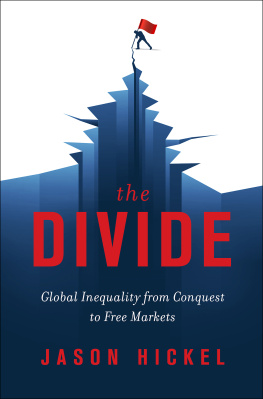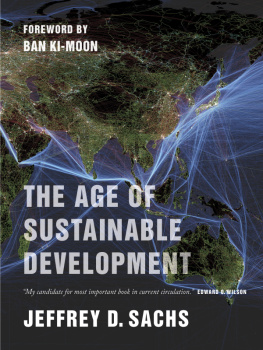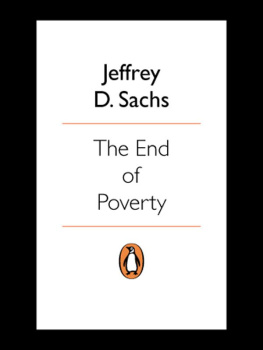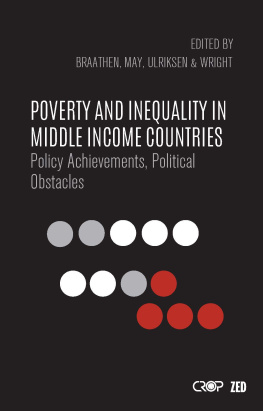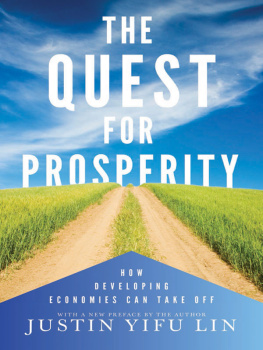THE POWER OF PRODUCTIVITY
THE POWER OF
PRODUCTIVITY
WEALTH, POVERTY, AND THE
THREAT TO GLOBAL STABILITY
William W. Lewis
THE UNIVERSITY OF CHICAGO PRESS Chicago & London

ACKNOWLEDGMENTS
I am pleased to acknowledge the contributions of several people to the creation of this book.
Jim Levine, my agent, wisely led me to the University of Chicago Press. Alex Schwartz, my editor at Chicago, skillfully managed me through the editing of the book.
Bob Solow, my former McKinsey partners Stuart Flack and Vincent Palmade, and my wife, Jutta, read and commented on the entire manuscript. Bob sent me three letters with detailed comments. Stuart has been a constant and close collaborator over the past twelve years in the communication of the results of my work, including the production of this book.
Others read and commented on selected parts of the book. They were Robert Montgomery, Erik Calonius, Susan Lund, Charles Shaw, Mark Templeton, Tim Broas, Danielle Lewis M.D., Christopher Lewis M.D., and Monica Lewis.
Orley Ashenfelter, Jared Diamond, and Erik Calonius gave me good advice about how to get a book published. Orley and Erik suggested that I go beyond the economic analysis of the first nine chapters into the political economy of why countries have different economic policies.
Omar Ancheta and Frank Scaldaferri from McKinsey computer support set me up with voice recognition software, which I used to dictate the first draft of the manuscript. My assistant, Jennifer Larsen, handled the logistical aspects of the production of the manuscript.
My former McKinsey partners Lenny Mendonca and Diana Farrell encouraged and supported me throughout this endeavor.
Finally, I want to recognize the 251 McKinsey consultants around the world who worked on McKinsey Global Institute projects over the past twelve years. The leverage they provided me is unprecedented. Also, thirty-five academic economists served diligently on the academic advisory committees for these projects. The consultants and advisers are listed in each of the McKinsey Global Institute reports.
PROLOGUE
For the purpose of helping you decide whether you want to read more than the first page of this book, I am listing here my ten main conclusions.
One, many people look for the causes of poor economic performance primarily in macroeconomics. An evaluation of economic per formance requires an analysis at the level of individual industries, such as automotive, steel, banking, and retailing. This is the sector level. You must also look at the sector level for causal factors for economic performance.
Two, beyond macroeconomic policies, economic analysis usually ends up attributing most of the differences in economic performance to differences in labor and capital markets. This conclusion is incorrect. Differences in competition in product markets are much more impor tant. Policies governing competition in the product markets are as im portant as macroeconomic policies.
Three, the Washington Consensus of the 1990s argued that such elements as flexible exchange rates, low inflation, and government solvency are the critical factors in economic health. One factor that was pro foundly underestimated was the importance of a level playing field for competition in a country.
Four, many people believe that the educational attainment of a nations current labor force is responsible for the success or failure of its economy. The importance of the education of the workforce has been taken way too far. In other words, education is not the way out of the poverty trap. A high education level is no guarantee of high productiv ity. The truth of the matter is that regardless of institutional educational level, workers around the world can be adequately trained on the job for high productivity.
Five, many people see access to capital as the determining factor between a productive growing economy and one that is not. Therefore, they feel that if rich countries sent capital pouring into poor countries, the poor countries would become richer. The solution does not start with more capital. The solution, rather, is in the countrys productivity or the way it organizes and deploys both its labor and its capital. If poor countries improved productivity and balanced their budgets, they would have plenty of capital for growth from domestic savers and for eign investors.
Six, most people consider social objectives to be good. Import tariffs, subsidized loans for small businesses, government disallowance of layoffs, and high minimum wages are all examples of economic policies designed to achieve social objectives. We cant have it both ways. These measures distort markets severely and limit productivity growth, slow overall economic growth, and cause unemployment. Rather than support these measures, it is better to level the playing field, create a big ger economic pie, and manage the distribution of that pie through the tax code for individuals.
Seven, most people dont recognize the destructive power of big government on economic development. Big governments demand big taxa tion. When part of the economy is informal, and untaxed, the burden falls heavily on legitimate businesses. This is a burden todays rich coun tries did not have when they were poor.
Eight, many people think the salvation is in the elites, the educated technocratic, political, business, and intellectual groups, who cooperate to manage economies through government. The elites are respon sible for big government. Particularly in the poorer countries, the elites license business activity, control international financial and material goods flows, promote unaffordable social welfare systems, and favor government-owned businesses. Too often, the elites reward themselves richly.
Nine, some people think that nations should protect their own industries but also ask outside nations for capital. This is wrong. Direct investments by the more productive companies from the rich countries would raise the poor countries productivity and growth rates far more effectively than sending them money. Poor countries have the potential to grow much faster than most people realize.
Ten, many people think that production is all that is needed to create economic value. This is why government sometimes protects businesses, regardless of their performance. They fail to make the link be tween production and consumption. The goods produced have value only because consumers want them. If they dont want them for some reason (such as high price), the business producing them needs to die. Only one force can stand up to producer special interestsconsumer interests. Most poor countries are a long way from a consumption mind set and consumer rights. As a result, they are poor.
These conclusions come from the studies conducted by the McKinsey Global Institute over the past twelve years. This work is based on how individual businessesfrom state-of-the-art auto plants to black-market street vendors and everything in betweenactually behave and perform on a daily basis. The understanding of an economy comes from the ground up rather than the top down; a grassroots view versus a birds-eye view. This book is going to provide the evidence and the arguments for my conclusions listed above.
How Did I Get Here?
In August 1990, I flew from Washington D.C. to Bangor, Maine, and drove a rented car to Bar Harbor. Meeting me there in his boat was Marvin Harris. I had run Marvin down a couple of weeks earlier through the University of Florida, where he was a partially retired research professor. Marvin had formerly been chairman of anthropology at Columbia and was a past president of the American Anthropological Association.


